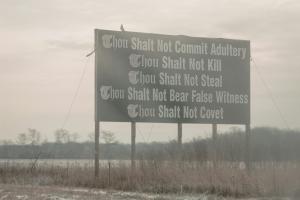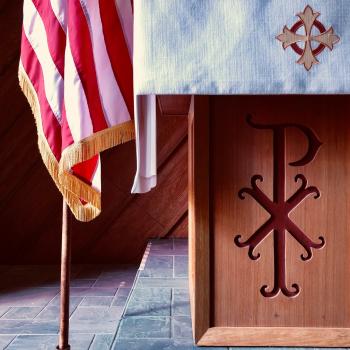
The past several election years have been traumatic for the American Church. The Body of Christ in America is being polarized and pulverized by political controversy and division. In that respect, we are no different than the rest of the country around us.
The term “Christian nationalism” has become a widely used term. It has proved helpful for people, including myself, to describe the co-opting of many Christians to become voting blocs for politicians. But in its popularity, it has become somewhat of a buzzword. And as the word loses its specificity, we lose our chance at articulating what it means to be the Church, politically speaking.
In this article, we will not be devoting much time to Christian nationalism. Rather, we will examine its alternative. Christian nationalism has its obviously negative connotations. But if we are to avoid Christian nationalism, what exactly are we to do? What is the alternative to Christian nationalism?
What is Christian Nationalism?
Before continuing on, we should first define what Christian nationalism is. Then, perhaps we can sketch out its accompanying ideas. Christian nationalism, simply put, holds to the idea that a nation should be Christian or Christianized. Not only is a nation Christian in its founding (as many claim of America), but a nation should be kept a Christian nation.
That definition, while quite intuitive, should be further unpacked.
Christian nationalism in the American context is anti-democratic. The US is predicated on the disestablishment of religion, guaranteeing the freedom of religious exercise and belief. America also has certain political processes.
The Supreme Court should make court decisions based on whether, for example, abortion is constitutional or not. The Court does not rule based on whether abortion is right or whether it is just. The basis of the Court’s rulings is supposed to be the Constitution, not the Bible or some moral law. The president is supposed to be elected by the people, not called to lead by God. And on and on it goes.
Christian nationalism, it seems, is thus the drive to establish Christianity even at the cost of a nation’s rules and functions. There are the questions, of course, of which Christian values to establish, and what type of church structure should become the model of political structure. But any particular version of Christian nationalism is Christian nationalism. (For example, Hindu nationalism in India is not based on Hinduism as a whole, but only on a particular type of Hinduism.)
Christian Nationalism: Promising or Obscure?

Having briefly explained Christian nationalism, we must also acknowledge its limitations. The Christian talk shows of yesteryear, as much as it pains me to admit it, have a point when they point out that the term is obscure. Or if the term is not obscure, it can be arbitrarily applied.
What, for instance, is the difference between a Christian nationalist, and a Christian who happens to be conservative? Or what sets Christian nationalism apart from voting based on one’s religious preferences and beliefs?
Scholars Jesse Smith and Gary J. Adler, Jr. have made contributions to the field of American religion and politics. In a paper they published, they call for conceptual clarity. They point out that “the concept of Christian nationalism is overextended and conflates multiple conceptualizations of religion in public life.”
Smith and Adler pull from Philip Gorski’s book, American Covenant, to draw a useful differentiation between Christian nationalism and other mixes of religion and politics. What Gorski calls “civic republicanism” still combines religion and politics, but not totally. As Smith and Gorski write, for civic republicans, “the question is not whether religious influences will be present in public life, but rather where, how, and within what boundaries.”
Paying close attention to the difference between forms of Christian nationalism and civic republicanism should make a difference on how we view the work of scholars like Andrew L. Whitehead and Samuel L. Perry. Whitehead and Perry, authors of the very impactful book Taking America Back for God, present us with valuable insights as to how Christians view America as a Christian nation. But their methodology also casts anyone who is Christian and a conservative as a Christian nationalist. Opposing same-sex marriage or abortion is not necessarily the same as wishing for America to be a Christian nation.
A Call for Caution
Before getting into what we might call an alternative to Christian nationalism, we should raise a call for caution.
Christian nationalism is anti-democratic. Though not all who would be characterized as Christian nationalists are Christian nationalists, those who really are Christian nationalists do threaten our democracy. If you refuse to play by the rules of American political procedure, even in the pursuit of your own vision of utopia, you are effectively damning yourself and your fellow citizens to national death and chaos.
That to say, Christian nationalism is important to talk about. But here is where caution is necessary. Overextending the label of Christian nationalism risks feeding into the already ongoing political polarization that America is suffering. It risks alienating Americans who are committed to democratic and civic virtues. And it also means that we risk missing the opportunity to name exactly what is putting the American Church in danger of political apostasy.
So when using the term, Christian nationalism, it must always be used with caution. We should pray that the Holy Spirit will help us to discern how we might name and confront the forces at work in political life.
The Alternative to Christian Nationalism

The question of discerning where Christian nationalism is, is a question for another time.
Here, I would like us to meditate on what the alternative to Christian nationalism should be. Because while the term is problematic and at times obscure, it will not leave popular usage anytime soon.
And so not only does the Church face the dangers of actual Christian nationalism. It also faces the ridicule and shame of people who misuse the term, or who think that Christian nationalism refers to all politically involved Christians.
So there is a two-pronged problem here. On the one hand, we have a limited and imprecise term. On the other hand, this term has become the most visible form of political Christianity in the US. Therefore, it is up to Christians who wish to practice faithful politics to show the Church and the world that there are better ways.
How to Pave Other Paths: Or, “What Do You Mean By That?”
Firstly, I wish to emphasize the plural in showing others that there are “better ways.” One of the flaws in Christian nationalism is that it demands that Christians be politically homogenous. They make politics to be on the same level as doctrine.
Christian politics is a pluriform and multifaceted mosaic. We are the Body of Christ, are we not? How we engage in political life should be diverse.
Underlying all these ways of political practice should be a critique. We should be very clear that we do not place our hope in a worldly nation. We should be loud about how we are citizens of another Kingdom. Jesus should be upheld as being above and beyond what any earthly empire has to offer.
Thus, in our conversations, we should be intentional about shaping the perspectives of ourselves and of others when it comes to politics and religion. As we saw in the first article here on Faithful Politics, religion and politics need not be a dangerous or scary mix. Our faith as Christians should lead us to seek the flourishing of all, not just for ourselves.
And so when we are in conversations about Christian nationalism, it would be to the benefit of all to care about how we use that term. And to set ourselves apart from the belief that we wish to Christianize this country and our neighbors through legislation and coercion.
As we remarked above, voting one’s values doesn’t make one a nationalist. It makes a citizen democratic.
Public Witness
Discourse and talk aside, how we act and live is the most important thing about all of this. Remember, politics is not just about voting and what states and nations do. It is also about who and where “the people” are, and how “the people” build a shared life together. Life-together is where we actually live out the alternative to Christian nationalism.
And so we as Christians should be very active in seeking the good of our cities in ways that are not reducible to who we vote for. We should be self-giving, others-oriented, and remarkable in how much our love for Christ leads us to show our love for others.
That is really what Christian love is all about. If Roman-occupied Judea had elections, I’m sure Jesus would have voted. But if He did go into the ballot box, the Gospels wouldn’t really change all that much. Matthew or Mark probably would’ve spent a chapter writing on how Jesus placed His vote and why He voted for who He voted for. But all the rest of the chapters would be the same.
We wouldn’t remember Jesus for His vote. We would still remember and be called to imitate His love, miracles, ministry, and passion for humanity through His death on the cross.

















